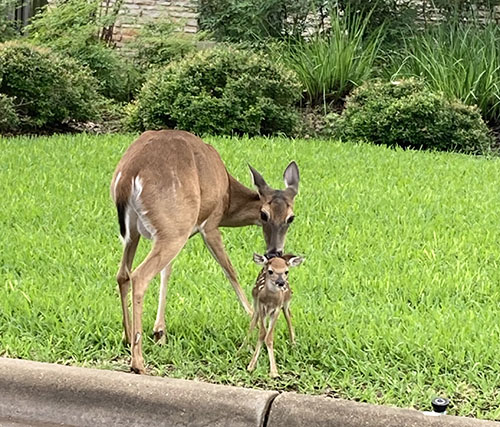 This time every year, whitetail and mule deer fawns begin arriving throughout Texas. Practically every county having suitable deer habitat will experience it. Most will be whitetails.
This time every year, whitetail and mule deer fawns begin arriving throughout Texas. Practically every county having suitable deer habitat will experience it. Most will be whitetails.
Despite efforts by Texas Parks and Wildlife Department (TPWD), outdoor writers, and many newspapers – totaling over 100,000 words of copy – untold numbers of people still think seeing a fawn alone means it’s abandoned. Too many want to help it.
That’s admirable. But unnecessary. And could be detrimental to the fawn’s safety. You don’t want to do that, do ya?
Fawns are born without scent. That helps protect them from predators. Otherwise, they are helpless when born. They aren’t capable of running fast enough to avoid capture, making them easy prey for coyotes, bobcats, mountain lions, and even domestic dogs that stumble across them. I still regret something I observed years ago.
Eating lunch on the ranch porch, I heard a frantic bleating sound across the hay meadow. Putting the glasses on it, I saw two large dogs chasing a doe. I jeeped down to assist the doe.
I had never seen these dogs before. They abandoned the chase when I drove up. One growled at me. The doe ran off into the brush. Then I saw the fawn — It lay dead a few feet away. The dog that growled had blood around its mouth.
The other dog came when I called, and I got an address off the collar tag. The killer ran off. The friendly dog climbed into the jeep when invited and I took it home – about a mile away. No one was home, so I put it in the fenced back yard and left a note. The owner later called and strongly denied that his dog could have done it since it was “inside the fenced yard all day!” The man calmed down when he realized I had read his dog’s tag — the only way I knew where it lived — and had brought it home. And my description of the other dog was a dog his dog often ran with.
Yes, dogs can kill fawns.
Does hide their little ones in high weeds or landscaping. The does then take a break from mothering newborns to grab a meal themselves — and a little well-needed rest from their duties. Human mothers will understand this. Does know where their fawns are hidden and will return. Most are good mothers.
Human interference may nullify the lack of scent, however, making fawns more vulnerable to detection. LEAVE THEM ALONE WHERE YOU FIND THEM! Most of the time, their mammas will be back. The fact that Texas now has an estimated five million deer indicates most fawns survive. Heat, drought, disease, and other factors take more of a toll than those mothers that have been hit by a car and can’t return.
Texas is suffering from its typical summertime drought and does may have to hunt nourishment longer than usual. Like human mothers, they remember where they left their babies.
They’ll be back.
JJ




